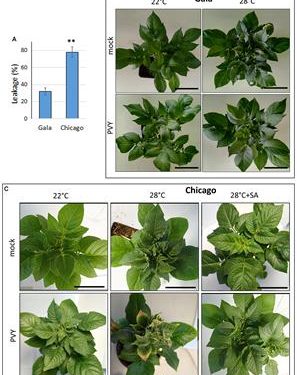: As one of the most devastating potato viruses worldwide, Potato Virus L (PVL) is a major concern for potato growers, agronomists, and scientists. This article aims to provide a comprehensive overview of PVL, including its symptoms, transmission, and management strategies.
Potato Virus L is a single-stranded RNA virus that infects potato plants, causing a wide range of symptoms including stunted growth, leaf curling, and necrosis. PVL is transmitted by aphids, as well as through infected seed tubers and vegetative propagation. The virus can have a significant impact on potato crop yield, quality, and marketability.
Effective management of PVL involves several strategies, including the use of virus-free seed tubers, insecticide applications to control aphid vectors, and the removal of infected plants to reduce the virus reservoir. Other methods, such as crop rotation and the use of resistant potato cultivars, may also be effective in preventing PVL transmission and reducing the impact of the virus on potato crops.
In conclusion, Potato Virus L is a serious threat to potato production and requires a comprehensive management approach for optimal crop yield. By adopting appropriate management strategies, growers and agronomists can effectively control PVL and ensure the long-term sustainability of potato production.
#PVL #PotatoVirus #PotatoProduction #AgriculturalManagement #CropYield #AphidControl #VirusManagement #CropRotation #SeedTubers #ResistanceBreeding







